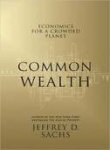Items related to Common Wealth: Economics for a Crowded Planet

Synopsis
In Common Wealth, Jeffrey D. Sachs-one of the world's most respected economists and the author of The New York Times bestseller The End of Poverty- offers an urgent assessment of the environmental degradation, rapid population growth, and extreme poverty that threaten global peace and prosperity. Through crystalline examination of hard facts, Sachs predicts the cascade of crises that awaits this crowded planet-and presents a program of sustainable development and international cooperation that will correct this dangerous course. Few luminaries anywhere on the planet are as schooled in this daunting subject as Sachs, and this is the vital product of his experience and wisdom.
"synopsis" may belong to another edition of this title.
About the Author
Jeffrey D. Sachs is the Director of the Earth Institute at Columbia University and Special Advisor to United Nations Secretary-General Kofi Annan on the Millennium Development Goals. He is internationally renowned for his work as an economic adviser to governments around the world.
From AudioFile
Sachs is an economist who sees overpopulation as the heart of the planet's problems. To solve those problems will require global cooperation. Nations must understand the need to go beyond parochial differences to avoid the destruction of our species. Malcolm Hillgartner is solid as narrator. He treats the material seriously, in the manner of a documentary narrator, but without the basso profundo voice that could quickly devolve into caricature. He varies his tone enough to keep the book interesting but not so much that it becomes distracting. The complexity of the book requires concentration on the part of the listener, so it's not for casual listening--but its message is worth the effort. R.C.G. © AudioFile 2008, Portland, Maine-- Copyright © AudioFile, Portland, Maine
"About this title" may belong to another edition of this title.
US$ 23.00 shipping from New Zealand to U.S.A.
Destination, rates & speedsSearch results for Common Wealth: Economics for a Crowded Planet
Common Wealth: Economics For A Crowded Planet
Seller: Book Haven, Wellington, WLG, New Zealand
Paperback. Condition: Good. In this book Jeffrey Sachs, one of the world's leading economists and author of the bestselling The End of Poverty , analyses and addresses the great, and interconnected, global challenges of the twenty-first century. A series of cascading threats to global well-being - the most significant being environmental degradation and rapid population growth - bear down upon our increasingly crowded planet. All of them are solvable, Sachs argues, but potentially disastrous if left unattended. Our task is to achieve truly sustainable development, by which he means finding a global course which enables the world to benefit from the spread of prosperity while ensuring that we don't destroy the eco-systems which keep us alive and our place in nature which helps sustain our values. Owner's Name inside. 386 pages. Seller Inventory # 1569911
Quantity: 1 available
Common Wealth: Economics for a Crowded Planet
Seller: Bellcourt Books, Hamilton, VIC, Australia
Soft cover. Condition: Very Good. 1st Edition. Jeffrey Sachs, one of the world's leading economists and author of the bestselling 'The End of Poverty', analyses and addresses the great, and interconnected, global challenges of the twenty-first century. First Australian Edition, First Printing, Soft cover in very good condition 386pp, colour graphs and diagrams. Seller Inventory # 090360
Quantity: 1 available

